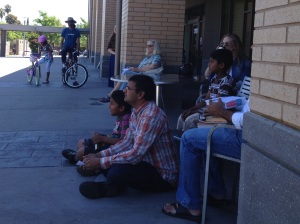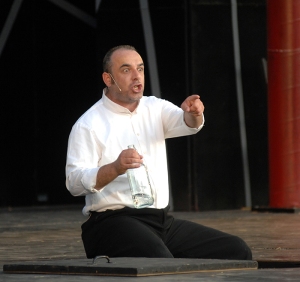Over the last two weekends, we’ve been performing “pop-up Shakespeare” in unexpected locations in Cupertino and San Francisco, as part of the Free Shakespeare in the Parklet project. This is the first time we’ve performed pop-ups anywhere but SF, and I had some trepidation about moving outside the “only in San Francisco” bubble. I imagined suburban police officers with little else to do arresting us all in front of the library, for “vagrancy and incendiary speech-making.”
Maybe I’ve just been reading too much. The latest entry on my summer book list is Nigel Cliff’s “The Shakespeare Riots: Revenge, Drama, and Death in Nineteenth-Century America.” I absolutely love its vividly imagined descriptions of what it was like to be an actor and theatre-maker in the two and a half centuries after Shakespeare.
As Cliff tells it, two hundred years ago, theatre really mattered, and Shakespeare mattered the most. In defiance of the French and German dramas preferred by the upper classes of 18th-century London, middle-class theatrical entrepreneurs reclaimed Shakespeare as England’s native son, deeply populist, a playwright the man on the street could understand. Regular working-class and middle-class people filled the theatres every night. Theatres were part social club, part political gathering, part artistic entertainment. At Drury Lane or Covent Garden, audiences might encounter prostitutes roaming freely among the seats, picnics spread out in the galleries, and plenty of fist-fights. Many times, the tragedy on stage was drowned out completely by the noise from the audience. The next day, fights broke out in the streets about favorite actors, favorite plays, even favorite line readings.
Theatre riot, 1700s.
Actors and theatre-makers were so influential, so capable of inciting strong feelings, that they had to be stopped. Prime Minister Robert Walpole’s 1737 censorship law, the Licensing Act, reads:
…every person who shall, for hire, gain or reward, act, represent or perform, or cause to be acted, represented or performed any interlude, tragedy, comedy, opera, play, farce or other entertainment of the stage, or any part or parts therein, in case such person shall not have any legal settlement in the place where the same shall be acted, represented or performed without authority by virtue of letters patent from His Majesty, his heirs, successors or predecessors, or without license from the Lord Chamberlain… shall be deemed to be a rogue and a vagabond… and shall be liable and subject to all such penalties and punishments…
Actresses preparing, 1700s.
Victorianism eventually managed to repress the audience’s boisterous behavior – according to Cliff, Queen Victoria herself chose spectacle over Shakespeare and preferred French melodramas to the native theatre – and the Shakespeare revival died out in England. However, in the 1830’s, Shakespeare was reclaimed and newly adored in America, and again the audiences were full of ordinary people relating to the all-too-human characters. African-Americans in particular embraced Shakespeare over other playwrights, with companies of Black actors performing the Bard to sold-out theatres like New York’s African Grove Theatre – where non-Blacks sat in a cordoned-off section in the back of the house. As Cliff puts it:
Every year, on the Fourth of July, America bonded around fiery rhetoric about its heroic struggle against the English tyrant, and every year Shakespeare was paraded, not as an example of England’s cultural dominance, but as an enlightened ally of the American dream.
African-American star Ira Aldridge..
Being an actor in 18th and 19th century England and America was a dangerous profession – you were alternately celebrated and reviled, you lived on pennies per day, you might roam from town to town by covered wagon or steamship complete with all the hardships of the frontier. If you were an African-American actor, you were in danger of being attacked by a white mob after the show. There was nothing safe or comfortable about working in the theatre. In some ways, this is still true – stereotypes of performers are alive and well, and lord knows we still survive on pennies per day (adjusted for inflation) – but thanks to Actors’ Equity Association and standards of ethics for theatre managers, there are at least comforts like travel stipends and health insurance.
But these days, theatre-goers in America have become a little bit like the Victorians. We spend hundreds of dollars on tickets to big-budget Broadway spectacles while neglecting the little theatre doing new plays just down the street. If a good play incites strong feelings, it would be very bad form to get into a fist fight at intermission – or even a passionate argument. When we enter one of the plush theatres downtown, we’re pleasantly enveloped in sotto voce conversation, greeted by courteous ushers, and given the hairy eyeball if we let loose with an unseemly guffaw. Thankfully, many theatres lately have relaxed enough to let us bring in a glass of wine and a cookie, but heaven forbid we arrive with a roast chicken and sausages. It’s a lot more civilized, but it’s kind of sterile. It’s a little too safe. It’s a little too comfortable.
Curious passers-by in Cupertino.
With Free Shakespeare in the Park, at least there’s no problem with the roast chicken. We remove as many barriers to attendance as possible, but I still see people stand at a distance, or sit at picnic tables far off to the side, as if what we’re doing isn’t for them. They didn’t know about it in advance, or they didn’t get there at 6 am to set up their blankets, or, like one woman I met in Cupertino last Sunday, they’re convinced that this MUST cost money that they won’t be able to pay.
Galen Murphy-Hoffman with Parklet audience members in San Francisco.
We started Free Shakespeare in the Parklet partially to remove those final barriers. You’re in the audience before you have time to worry about it. You can still walk away, but the stakes are low – you don’t have to find a seat, bring a picnic, plan anything at all. It just happens, and you happen to be there. It lasts 10-15 minutes, then it’s done and you move on. But hopefully you’ve heard something interesting – maybe it jogged a memory or created one, maybe it was just a little unexpected delight. Maybe you’ll come back for Macbeth, because hey, that was pretty easy to understand. Or maybe it was an annoyance! Maybe your day has been interrupted by stupid actors popping up and preventing you from getting your morning coffee unmolested. Maybe we aren’t doing it right unless there’s someone out there who calls us rogues and vagabonds and thinks we’re a terrible influence.
Galen Murphy-Hoffman and Leighland Hooks in Doctor Faustus.
These last two weekends, we’ve brought scenes from Doctor Faustus and Richard III to Cupertino and San Francisco. In the first (on the theme of “Sorcery”), Faustus rejects philosophy, medicine, and religion in favor of magic, and makes his choice sound very appealing. Right in front of Cupertino Library and Grace Cathedral, he called on the powers of darkness to send him the demon Mephistophilis.
Galen Murphy-Hoffman as Faustus.
As the director of the scene, one of my goals was to reach kids who are deeply interested in the battle between good and evil, as in their beloved Harry Potter, and want to see plays with life and death at stake. I loved watching the kids in the audience in Cupertino suddenly notice Mephistophilis creeping up from far away down the street – they pointed, and squealed, and whispered amongst themselves.
Nobody got arrested.
Cupertino Library audience.
In the Richard III scene (on the theme of “Skullduggery”), the Duke of Clarence has just had a terrible nightmare. He did some pretty awful things to put his brother Edward on the throne, and it’s payback time. Watching the scene on a Sunday morning, I was struck by its deep debate about sin and forgiveness. Like Macbeth, the scene struggles with the concept of Equivocation – is it okay to do evil if you’re doing it under orders from someone higher up the food chain? Is it okay to commit murder in the name of a righteous cause? Is there a Heaven, and if so, who gets to go there?
Radhika Rao and Ryan Tasker in Richard III.
Richard III popped up in Cupertino right in front of a popular local brunch place. Some of the diners beat a hasty exit, dragging away spouses who looked back over their shoulders as long as possible. Others stayed, laughed, clapped, and asked us questions afterwards. The children especially watched wide-eyed and fascinated by the story unfolding in front of them, too young to know that this sort of thing is supposed to be an expensive indoor activity, observed safely from the dark in your comfy velvet seat.
Nobody got arrested.
Tristan Cunningham, Brian Herndon, and Radhika Rao in Richard III.
This coming Saturday, July 27 at noon in Cupertino’s Memorial Park, we’ll be performing another bit of Skullduggery, a delightful scene from Measure for Measure, in which the young criminal Pompey does some community service to work off his sentence. He’s apprenticed to the taciturn, intimidating executioner Abhorson, and the two of them are charged with a difficult task – behead the notorious Barnardine, who has decided that he is not in the mood to be executed today. Measure for Measure has a dark, edgy humor that anticipates Macbeth’s Porter scene, and will feature our production’s Porter, Bill Rogue, as Barnardine.
Bill Rogue as the Porter.
Look for us on the playground near the set of Macbeth. We’ll be the vagabonds, the roaming players, believing that theatre still matters, Shakespeare still matters, and that he’s still America’s playwright and the voice of the people.
Related articles
- This Day in Black History: July 24, 1807 (bet.com)
- Does Shakespeare Matter? (mfayle.wordpress.com)














A fabulous article! I have loved the Shakespeare in the Parklet performances that I have seen, and you have done a great job of putting them into an artistic and historical context. I am thrilled to learn that I am not alone, and that there were people like me in the past. I’m looking forward to seeing more parklet scenes this summer, and then the full length production of MacBeth in the Presidio on Labor Day weekend. Thank you for taking the time to write this beautiful blog post, and please keep writing more.
pax
Vox
Thanks, Vox! A new post will be going up in the next couple of days, all about casting Shakespeare. Let me know if there are any particular subjects you’d like me to tackle!